“Where is your list, and how many cartons do you want to buy”, the sales boy asked a customer while holding a list of drugs handed to him by another. It was a typical day for John, a sales boy at Odera Pharmacy in Mararaba, along the Abuja-Keffi road. The fairly big pharmacy advertises itself on Facebook as being “a pharmaceutical outlet that deals on wholesale of all kinds of genuine drugs.”
Our correspondent watched as customers came in and out of the pharmacy to buy drugs in large and small quantities. Among them is a drug hawker who came to buy one poly bag size quantity of assorted drugs.
Advertisement
After the sales boy handed him the bag, he walked away from the pharmacy confidently and crossed to the other side of the highway to board a commercial vehicle back to his shop.
He flagged a taxi heading towards the city centre. THE WHISTLER also joined him on the trip and opened a conversation.
Sule said he came into the business of drug hawking two years ago, a few months after he arrived Abuja from Kano. He revealed that a friend introduced him into the business and since then he has been doing well.
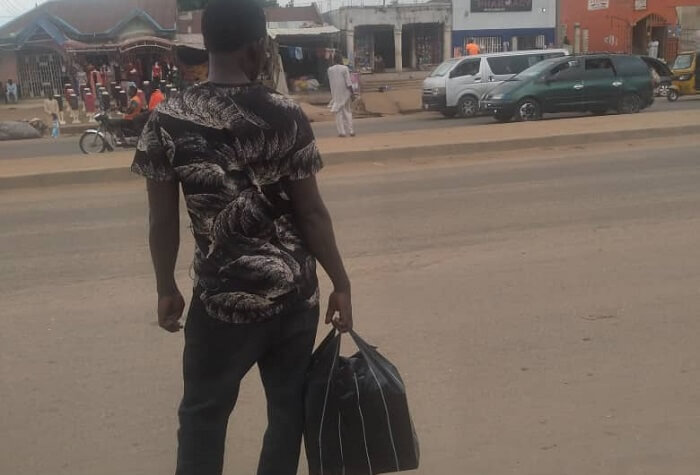
Advertisement
He had only a secondary school certificate and had no licence to engage in sale of pharmaceutical products. He said he had never heard about the National Agency for Food and Drug Administration and Control (NAFDAC) since he started selling drugs two years ago.
He ran out of stock and went to Odera Pharmacy to restock as he had no other business that provides income for him.
“I go buy medicine wey I dey sell, I no be doctor oh but I sabi sell am and e dey work,” he said with a look that seemed to seek confirmation of his claim.

Advertisement
He had just bought assorted drugs worth a meagre ten thousand naira—mostly pain killers, anti-malaria drugs and antibiotics. His clientele includes petty traders like him, menial job workers and commercial tricycle riders.
He didn’t check the expiry dates of the drugs he bought and so do his clients. His only concern, as well as his customers, is to get drugs for particular ailments.
“I have been selling medicines for over two years now, and that is where I make money from.
“These medicine works, as you can see, I am just coming from Pharmacy where other people buy too,” he said, again seeking confirmation as he looked at the reporter.
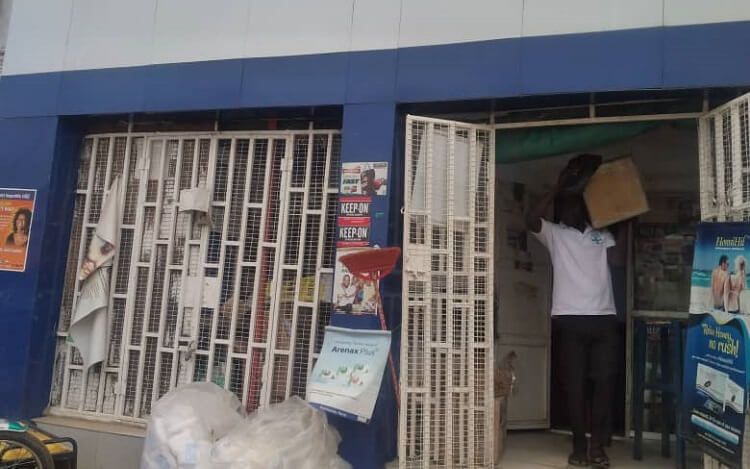
When the reporter talked to him about NAFDAC and police operatives, his face squeezed into an incredulous mien as if the reporter had mentioned aliens. “We no know who be NAFDAC, I never see them since I start this business. Nobody they pursue us from our shop,” he said, adding that police operatives do not disturb them because “We are not thieves; we are doing our business quietly just as other people.”
Advertisement
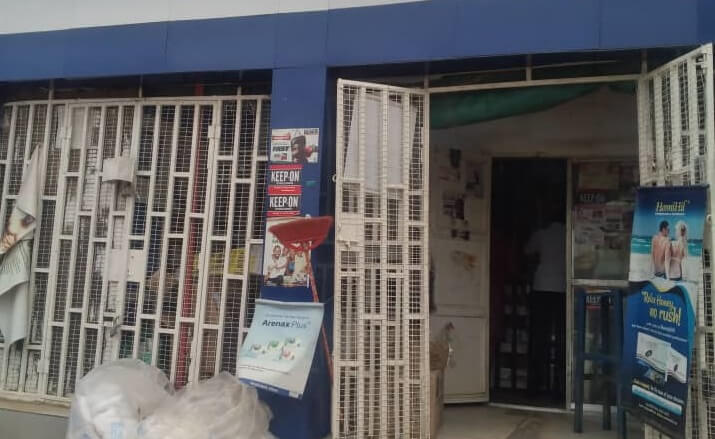
As the taxi approached the AYA Roundabout, he told the driver he would stop soon. He came down at the AYA roundabout. I also came down and further trailed him to his shop to see how he stored his drugs.
After nearly 20 minutes’ drive from Mararaba area, Sule highlighted at the roundabout and crossed to the motor park where he sells his goods. His small “shop” is one of the several umbrella-shaded medicines stands occupied by traders who also source their products from pharmacies like that of Odera.
Come rain or shine, they are always there displaying their baskets of assorted drugs. The drugs are stored inside locally fabricated steel boxes without regard for temperature levels.
Sule is an example of how unwholesome practices among wholesale medicine stores fuel drug hawking in Nigeria’s Federal Capital Territory and endanger lives of their patrons. Traders like him are found in different communities within the FCT.
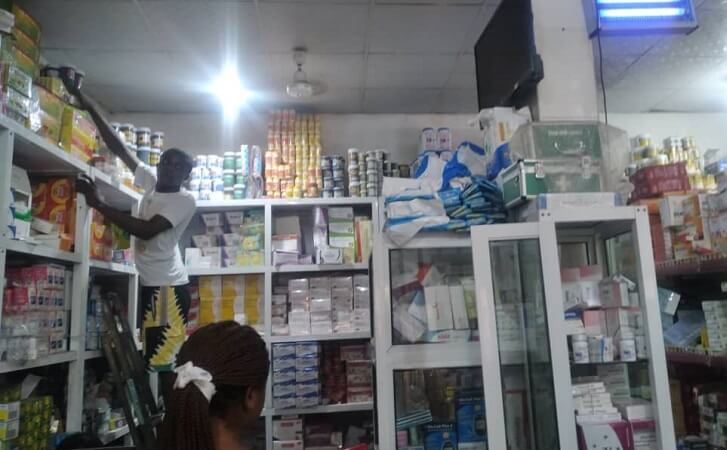
The sales boy at Odera Pharmacy took the reporter for a customer and asked, “Madam, what do you want to buy.” After the reporter replied that she was neither a doctor nor a pharmacist, he said, “we sell drugs to all customers, not just doctors or pharmacists. You do not really need to be a registered health worker for us to sell drugs to you, I know of some stores that do that, but we don’t.”
Obviously, Odera, like many others in the city, are motivated by commercial gain to violate regulations of the Pharmaceutical Association of Nigeria which forbids distribution of drugs to non-licenced persons or groups.
The experience was similar at Odogwu wholesale medicine store in Lugbe, along the Nnamdi Azikiwe International Airport road, where Hassan, the sales boy, rolled out cartons of drugs, taking the reporter for a potential customer.
“All I need to know is the type of drug you want, and in what quantity,” he said after the reporter identified herself. “We sell to all customers; most of these pharmacies you see around, they buy from us too.”
Indiscriminate sale and distribution of drugs have continued to fuel drug hawking in all parts of the country, especially in the FCT. THE WHISTLER findings show that drug hawkers get their supplies from wholesale medicine stores.
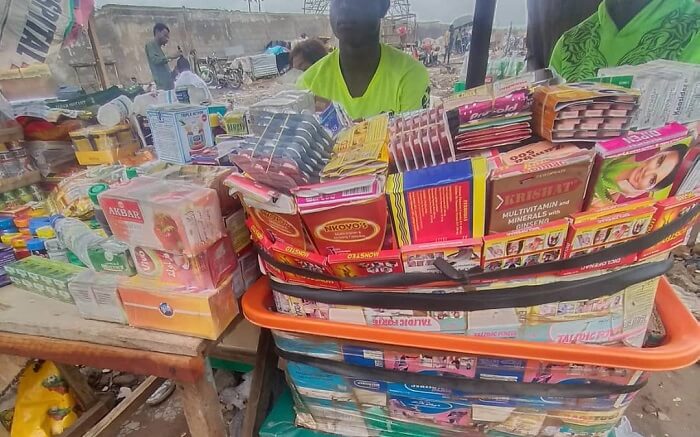
After buying these drugs from the wholesalers, they do not care about handling and storage since they’re not trained health practitioners. Like Mohammed, who sold a tablet of Vitamin C to the reporter, explained that after the day’s sales, he carries the basket into a store where they are kept till the following day, then he brings them out again for sale. He continues the circle until the day he runs out of stock.
While with him, one of his regular customers called his phone and complained of having a cold. He told the reporter that he knows what drug to administer for all ailments by experience. He said people patronize them because their drugs are cheaper than those in standard pharmacies.
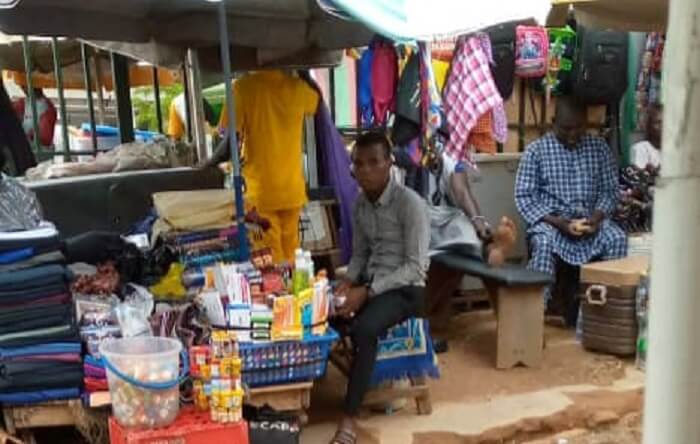
“I buy these drugs from the market and store them inside a big carton in one of these shops here. Many people do not know that we sell these medicines here, because people think that it is only those that have shops that sell medicine, but our customers know that we are here and they patronize us every day,” he said.
No Enforcement of NAFDAC Regulations
There’s no evidence that NAFDAC has executed its law enforcement mandate against violation of its regulations against distribution and sale of pharmaceutical products in recent years.
Information on the agency’s website indicates that the last case recorded was on the 9th January, 2019, when officers intercepted a trailer transporting assorted Pharmaceutical products to an unknown destination.
The importer, Luke Mbah, was arraigned at the Federal High Court, Lagos for smuggling over three hundred-million-naira worth of drugs including cough syrup, Afrodic (Diclofenac Potassium) tablets, Feed-Fine (cyprohenptadine) tablets (50mg each) and De Really Extra (Diclofenac Sodium tablets).
Before then, only two other cases were reported. The one of Madubuike Chukwunonye who sold a controlled drug (Emzolyn with Codeine Cough Syrup) to a BBC undercover reporter in April, 2018. He was also arraigned at the Federal High Court, Lagos.
The agency also reported the arrest of an importer and distributor of counterfeit international brands of pharmaceutical products, Kenneth Okereke (aka AGAMA) and one other in August, 2015.
Products seized included Zinnat tablets 250mg (Cefuroxime axetil), Proviron tablets (Meserolone 25mg), Augmentin 625mg (Amoxicillin + Clavulanate), Clomid tablets (Clomiphene citrate), Glucophage 500mg tablets (Metformin), Casodex 50mg (Bicalutamide), Cytotec 200mcg (Misoprostol), Cataflam 50 (Diclofenackal), Tegretol 200mg (Carbamazepine) amongst others.
No case of city drug hawkers was reported on its website, although NAFDAC regulation on goods distribution practice for pharmaceutical products stipulates that a distributor (which is a person or organization that handles, sells or distributes drugs) is expected to supply pharmaceutical products only to authorized persons.
The Investigation and Enforcement Directorate of NAFDAC is saddled with the responsibilities to ensure compliance and punish violators of the regulations.
But the law enforcement arm of NAFDAC seemed to have been overwhelmed as drug hawking has become a common feature in the streets and markets of the FCT. And it does not appear it is a serious concern for NAFDAC which now seemed to be focused on enlightening consumers instead of punishing violators.
This was confirmed in an interview with the Director of Public Affairs, Jimoh Abubakar, who told THE WHISTLER that the agency had embarked on programmes to sensitize consumers on the ills of patronizing drug hawkers.
He said it was the result of a “systemic problem” which started long time ago, adding that different ideas on developing a proper drug distribution chain by past health ministers and stakeholders did not yield the desired result.
He said, “I think there is also an economic issue with these practices because these pharmacies want to sell their goods not minding who the buyers are. So, they boycott the set standard, and we would not want to push them out of their business.
“The least of their problem is whether customers have license to buy. So, there is no penalty because people buy drugs for different purposes.
“What NAFDAC is doing to address this issue is to tackle the source, the distribution chain, and the end-users of the drug.”
He said for now, NAFDAC is focusing on tackling the issue from the consumers’ end by carrying out programmes to educate them on the effects of drugs sold by hawkers.
“So, when we are able to convince these consumers otherwise, these hawkers will not have a market they sell to, they will stop the trade. Our emphasis is on educating the consumers because it is the consumers that keep them in business.
“We do not regulate who you sell your goods, our concern is on the quality of the goods you are selling,” he said.
Pharmacists Blame NAFDAC
The Pharmaceutical Society of Nigeria has also condemned the irrational sales of drugs by pharmacists, and claimed that NAFDAC, as the regulatory body, was not doing enough to regulate the activities relating to drug distribution across the country.
The President of the Society, Sam Ohuabunwa, in a chat with THE WHISTLER, said the practice is against the code of conduct of registered pharmacists. He explained that ideally, drugs are supposed to be handled by only authorized persons who include licensed pharmacists, registered patent medicine dealers and registered medical practitioners.
He revealed that efforts by concerned stakeholders to curb the disheartening trend of drug hawking have not yielded the desired result over the years, adding that NAFDAC was not doing enough to curb the menace.
“We have raised this issue over time, we do not have the power to arrest the hawkers or shutdown these stores,” he said, adding that there is a “lack of political will to tackle this menace as well as shut down the sales of drugs in the open market.” He said until the source of the problem is tackled, the country may have to deal with it for a long time.
Speaking on the dangers posed by these hawkers, Ohuabunwa said, “It is disheartening that this is what we see in Nigeria, where all manner of people, both the educated, the uneducated, and those who do not know the difference between medicines and food are selling and administering drugs.
“Majority of those drugs are fake. Even those that were genuine when they were bought must have become unsafe because they were exposed to heat and humidity. Pharmaceutical medicines are chemicals, many are organic and some inorganic, but they are all chemicals and they respond to weather conditions.”
He however assured that the PSN would take disciplinary actions against pharmacists linked with such unwholesome practice.
This special report was supported by the Civic Media Lab, Lagos.


